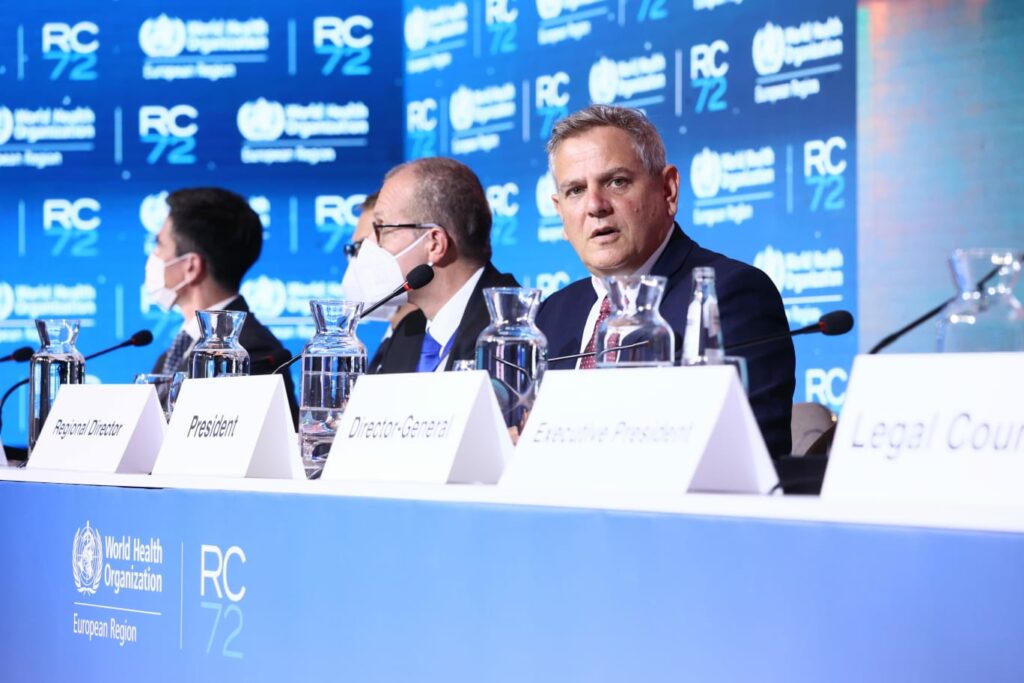Israel is honored to host this important conference of the WHO/Europe Regional
Committee. We welcome the opportunity to advance relations and promote
collaboration with the World Health Organization and our friends and partners
around the world. This is an exhibition of our commitment to our shared values of
providing high-quality and equitable health.
This was a very successful, in-depth and enriching conference. We had fruitful
bilateral meetings and agreed on meaningful regional actions plans. As far as I
can say, this conference was productive and met our goals. Countries
strengthened their collaborations, connected and shared the newest knowledge
in the fields of health.
זו זכות גדולה לארח את הכנס של ארגון הבריאות העולמי – בפעם הראשונה בישראל. יש לזה
משמעות אדירה עבור מערכת הבריאות הישראלית ועבור מדינת ישראל. ההענות היתה
מדהימה, עשרות שרים ומשלחות מ-50 מדינות אירופה הגיעו והכנס היה מוצלח ביותר.
המדיניות שהובלנו בקורונה, והיכולות של מערכת הבריאות הישראלית בלטו מאוד בזירה
העולמית ועוררו עניין גדול מאוד גם בכנס הזה. נפגשתי עם עשרות שרים, וגם מנכ״ל המשרד
פרופ׳ אש נפגש עם ראשי מערכות מכל אירופה, חתמתי על כמה וכמה הסכמי שיתוף פעולה
חשובים. אחרי הימים האלו לא נותר מקום לספק – ישראל היא שם חם בבריאות העולמית. אני
שומע הכרה והוקרה בינלאומית למערכת הבריאות הישראלית ומה שיש לה להציע לעולם. הכנס
הזה היה בוסטר אדיר לקשר של ישראל עם אירופה, ולשיתופו הפעולה בהמון תחומים בעולם
הבריאות ומעבר – ישראל היא היום שחקן מרכזי בזירה הבינלאומית. יש לזה משמעות למערכת
הבריאות הישראלית, למחקר, לעסקים, לפיתוח, לשיפור שירותי הבריאות שלנו בישראל – ויש
לזה גם משמעות מדינית חשובה.
Recently, the whole world received an important reminder of the meaning of
partnership. COVID-19 and health emergencies are blind to borders between
countries, race or religion. Without international cooperation, knowledge sharing,
and guaranteeing distribution of vaccines and medicines, it is impossible to
defeat an epidemic. It is not enough to treat COVID-19 in a certain country, or to
vaccinate the population in one or two countries – we needed a global holistic
approach driven by international cooperation.
Another important factor in managing pandemics, and actually any health crisis,
is equal access to health. Health inequality is an actual obstacle in handling
global emergencies. Disparities in access to health service due to socio-
economic status or geographical location is a problem not only of those who lack
access to adequate services, but to all of us, in every country. Closing health
gaps is an interest of each of us, no matter where we are from, from every
position.
Today, there is no doubt that countries with stronger State regulated universal
health coverage are much more prepared and protected from major crises. I
commend the WHO for its tireless work in promoting Universal Healthcare.
The Israeli public health system, built on the foundations of universal healthcare,
was the bedrock of our COVID-19 response. The sick funds and public hospitals,
the amazing infrastructure that knows how to reach every person in Israel, and
provides access to treatment and vaccinations.
Global cooperation is another asset that we must cultivate – and not only in the
face of pandemics. Israel strives to be a significant player in the international
community, and we have much to offer, particularly in the field of health. We seek
to strengthen our cooperation with the WHO and WHO/Europe, in all aspects of
public and global health, from emergency preparedness to digital health.
This is one of the reasons I am initiative the process of opening an International
Center for Digital Health, here in Israel. With the goal of sharing knowledge and
expertise in this pioneering new field, in order to make healthcare more effective
and accessible around the world.
Israel seeks to play a positive role in tackling major global crises and tragedies.
This includes providing medical assistance to Ukraine and adapting our health
services in the face of global climate challenges.
Israel deployed a field hospital to Ukraine in the beginning of the Russian
invasion. Israeli doctors treated thousands of Ukrainian citizens. I visited
there personally. Israel, as a part of the free and democratic world, stands
with the Ukranian people. In my opinion this is our moral duty.
My hope is for peace and equality globally and here at home.
My job is to maintain a strong, accessible, and equal public system for every
person. Health is a fundamental right, without it the other human rights cannot be
fulfilled, and the health systems have the responsibility to protect this right.
One topic that is close to my heart is access to safe abortions. Abortion is not
only a human right, not only a woman's right to make a decision concerning her
life, it is also her right to health.
In Israel, we recently passed new regulations that make it easier for women who
choose to have an abortion, with minimal bureaucracy and less state intervention
in their decision. This joins a series of decisions we have recently made to
equalize health care for LGBTQ people, and promote service to transgenders. I
see this as our main purpose as the leaders of the healthcare systems, as our
basic duty.
The strains on public health systems are global, particularly as populations age.
We have a responsibility to respond appropriately. The challenges we face are
many, but with each challenge comes an opportunity: to sharpen knowledge,
develop technologies and improve practices. By working together, we can tackle
these challenges head on, and make the most of the opportunities that lay before
us, while building better healthcare for people around the world.

